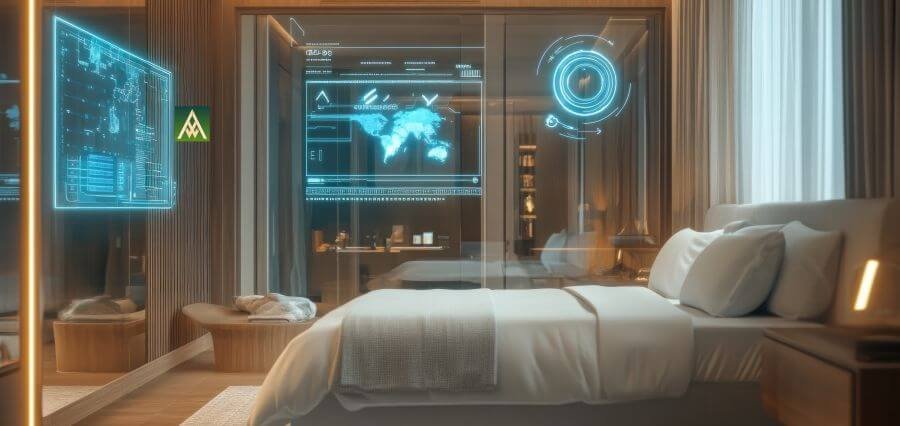The hospitality industry is being revolutionized digitally with shifting consumer behavior and fast-paced technological advancements. Today’s travelers do not require only a night’s bed—they crave frictionless, personalized experiences from check-in to check-out. To satisfy this, the advent of smart hotels driven by Artificial Intelligence (AI) and Internet of Things (IoT) is giving birth to a new type of hospitality where convenience, comfort, and customization come together.
From smart energy systems to voice-command room controls and AI-based concierge services, smart hotels are redefining what luxury, efficiency, and guest delight can be delivered. These are not add-ons; they are emerging as the core pillars of hotel business today.
Personalized Stays Through Artificial Intelligence
At the heart of the smart hotel revolution is AI’s capacity to deliver highly personalized experiences. AI algorithms analyze vast amounts of guest data—from previous stays and preferences to real-time behavior—to tailor every touchpoint in the guest journey.
Even before the customer checks in, booking systems powered by AI can offer room types, meals, or spa packages based on a customer’s profile. During check-in, facial recognition can speed up the process and even eliminate the need for checking in at the front desk. In the room, smart personal assistants such as AI-powered chatbots or voice assistants manage everything from temperature and lighting to entertainment and food ordering.
Aside from convenience, personalization also ensures a more heightened emotional bond between the guest and the brand. Whether remembering a guest’s pillow choice or addressing a meal to suit dietary need, AI allows hoteliers to deliver personalized hospitality at scale.
The Internet of Things: An Interconnected Experience
Whereas AI is the smart hotel’s brain, IoT is its nervous system—communicating to devices, systems, and sensors to ensure a seamless, intuitive experience. In-room IoT devices adapt according to occupancy, reducing energy consumption without sacrificing comfort. Guest-sensing thermostats adjust temperature in response. Motion-detecting lights and smart curtains enhance sustainability and user convenience.
IoT doesn’t stop at the guest room. Smart keyless room access via smartphone, real-time monitoring of bags, location-based services in the hotel, and smart elevators all come together to provide an experience that is frictionless and seamless. Housekeeping staff also benefit from this—IoT alerts provide notice ahead of equipment failure or maintenance needs so they can be addressed before they cause any disruption.
With the coming together of hotel infrastructure, IoT enhances operational efficiency and guest experience, laying the basis for smart hospitality.
Operational Efficiency and Sustainability
Impressing guests is only one aspect of smart hotel technology—it optimizes back-of-house operations and facilitates sustainability. Predictive maintenance with IoT reduces equipment downtime and repair costs. AI-facilitated demand forecasting maximizes staffing efficiency and inventory management in kitchens and supply chains.
Another key advantage is energy management. Intelligent HVAC and lighting systems learn to use resources in accordance with occupancy, reducing energy consumption and operating costs significantly. Water usage can be monitored and optimized by IoT-enabled plumbing and thus help in the attainment of more abstract sustainability goals.
This partnership of profitability and environmentalism not only saves costs but also appeals to the tastes of the ecologically conscious traveler of today. For some, sustainable policies by an environment on the part of a hotel are now an essential aspect of booking decision.
Redefining Guest Service with Virtual Concierge and Automation
Concierge services have been the luxury hospitality signature in the past. Today, virtual concierges powered by AI are shaking up guest service with 24/7 multilingual assistance, real-time response, and hyper-relevant recommendations.
The guests can request information on local sites, reserve dinner, or request housekeeping through voice-activated devices or apps without needing to step out of their room. The systems learn through user behavior to enhance their response more accurately and relevantly over a period of time.
Meanwhile, robotics automation is extending into the operations. Some hotels employ service robots to deliver food to the guestroom, undertake sanitation, or push suitcases, cutting the likelihood of errors and the time required to serve. None of these technologies replace people; instead, they enable employees to focus on more valuable, person-to-person interactions with customers.
Security and Data Privacy of the Smart Hotel Age
While the benefits of AI and IoT are extensive, they place greater security and data privacy threats. Hotels make transactions and deal with sensitive data—from personal identity, payment details, and behavioral data. Securing this data is not only a matter of complying with the law, but a matter of trust as well.
Intelligent hotels must make safe network design a top priority, encrypting data in transit and secure access controls. Auditing regularly, compliance with data protection laws such as GDPR, and transparency in privacy policies are essential to guest trust in an increasingly networked world.
Besides that, correct use of AI—i.e., not intrusive monitoring or misuse of biometric data—will be important to making sure that technology enriches the guest experience, but doesn’t invade it.
The Future is Smart Hospitality
The smart hotel trend is not a fad—it is the future of hospitality. As travelers continue to crave seamless, intuitive, and interactive journeys, IoT and AI will be invaluable companions in the quest to conquer and reach dreams.
Early-adopting hotel brands are already embracing these technologies not only to differentiate themselves in a competitive environment but to future-proof their businesses. By integrating intelligence, automation, and connectivity into every level of service, intelligent hotels are reimagining hospitality from a transaction to an experience of transformation.
The most successful hotels in this new world will not be the ones that offer the greatest number of amenities, but those who understand their guests best—anticipating needs, responding instantly, and serving up moments of personalized connection. And at the heart of it all, fueling that success, will be the intelligent marriage of AI and IoT: turning buildings into experiences, and guests into champions.




